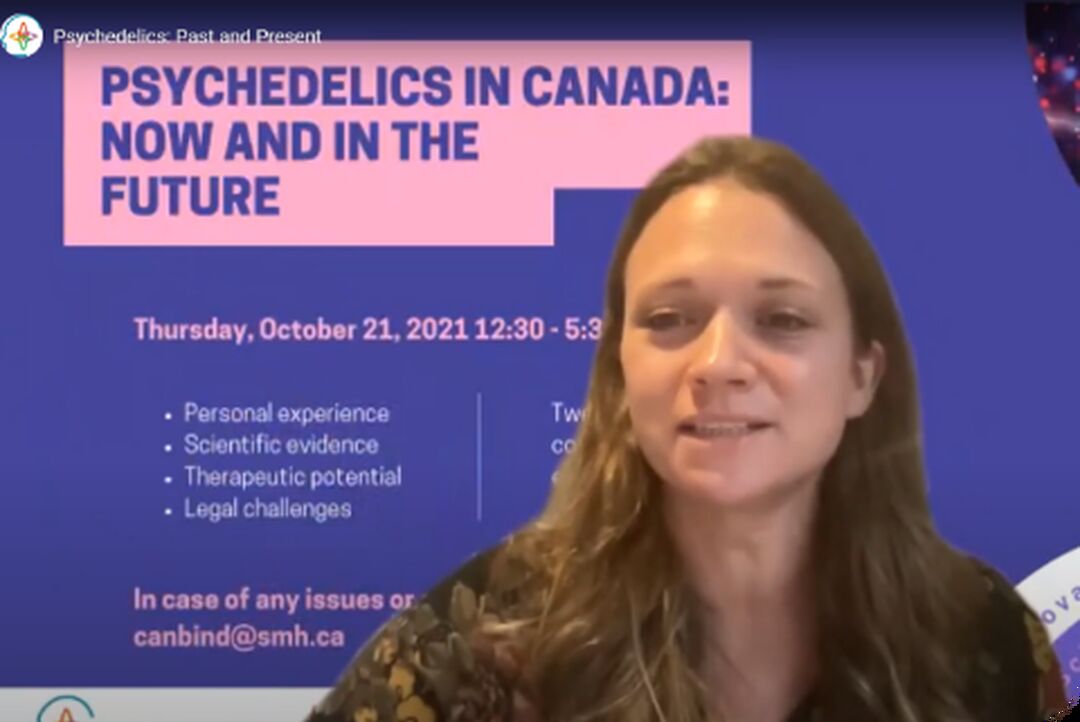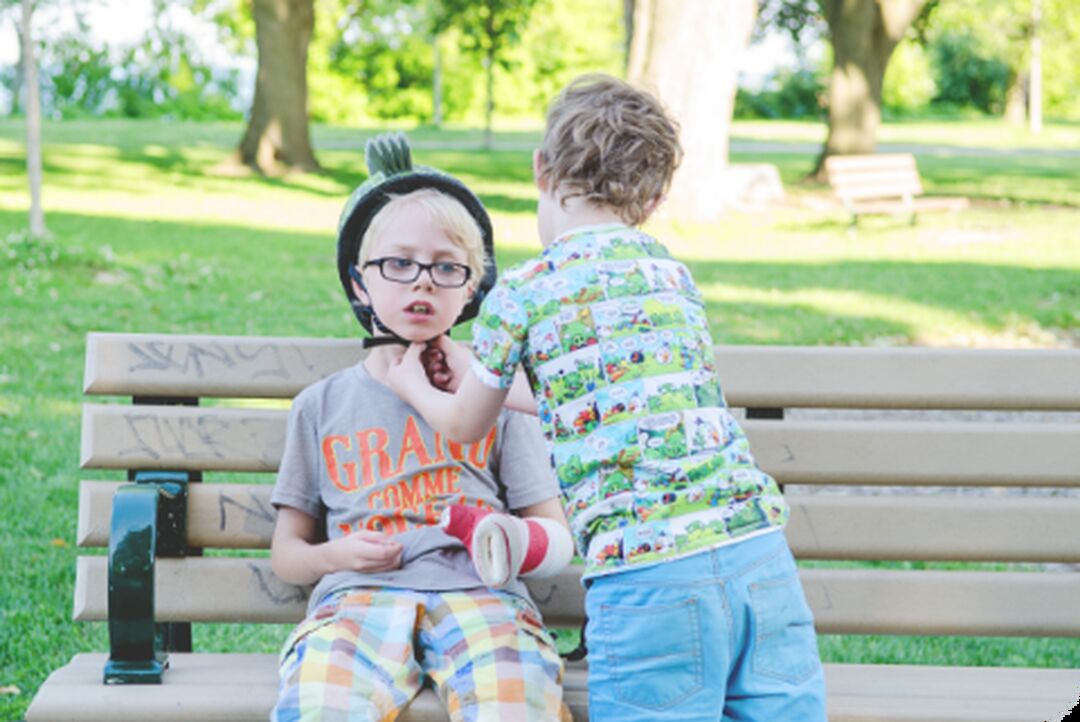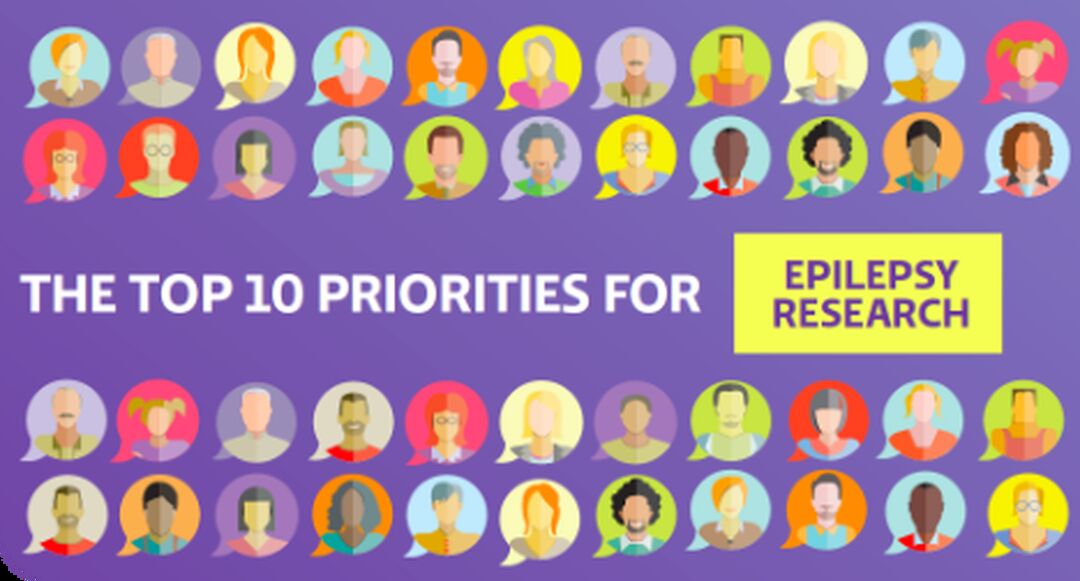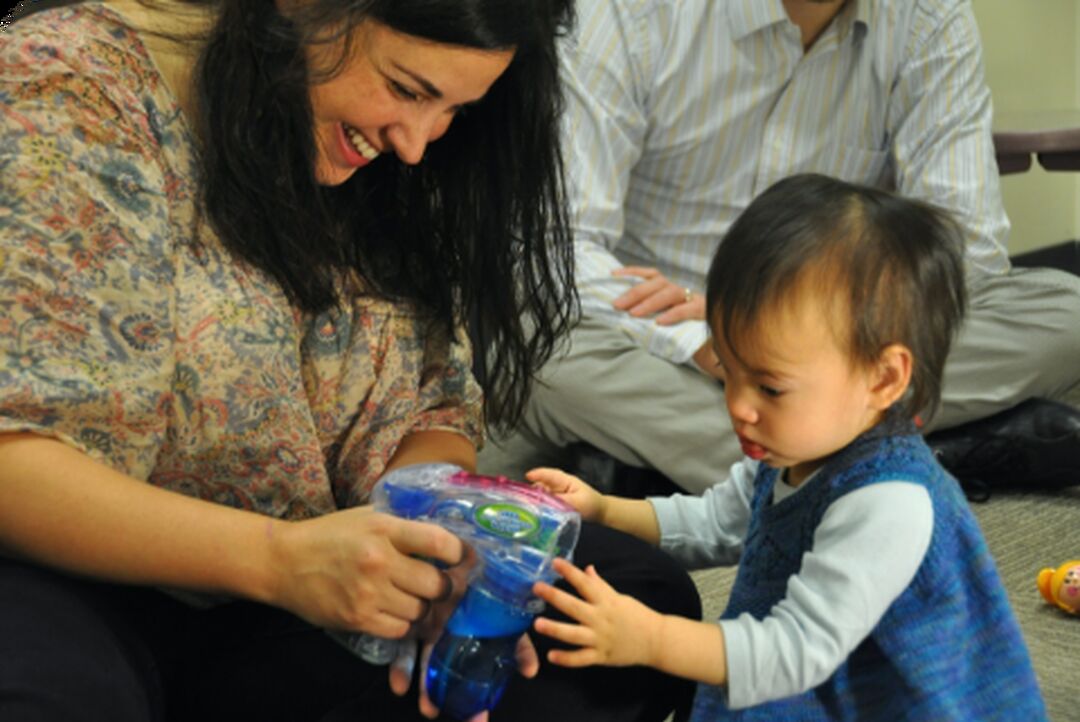Advancing Knowledge
More StoriesOBI strives to ensure that the public benefits as we advance our knowledge about the brain. Knowledge translation closes the gap between “what we know” and “what we do” to ensure we are translating research into better care for those living with brain disorders.
In this section, read the following stories of how OBI supported advancing knowledge:
- CAN-BIND Psychedelics Research: Now and in the future
- ONDRI study highlights unique challenges faced by caregivers
- Groundbreaking research on wellbeing in young people with cerebral palsy
- Furthering patient priorities with the Epilepsy Partnership Forum
- CONNECT Resource Library: Advancing Concussion Patient Care
- Data to enable faster scientific breakthroughs in pediatric neurological conditions

CAN-BIND Psychedelics Research: Now and in the future
Paving the way forward for how psychedelics can be utilized to treat mood disorders and beyond, the Canadian Biomarker Integration Network in Depression (CAN-BIND), an OBI Integrated Discovery Program, brought together experts across a wide range of academic, clinical, business, legal and lived experience perspectives to explore the rapidly emerging field of psychedelic use in clinical practice. CAN-BIND held an informative and engaging conference titled Psychedelics in Canada, Now and in the Future to discuss the latest scientific evidence and how psychedelics can be used in therapeutic settings. Some of the most promising clinical uses for this class of drugs are post-traumatic stress disorder (PTSD), treatment resistant depression, and end of life care.
Various aspects of psychedelic use were explored during three expert panels during the conference. The first panel, chaired by Dr. Emma Hapke, covered the history of psychedelics, their mechanisms of action, and how they influence neuroplasticity. The practice of microdosing was discussed and evaluated, and evidence from large clinical trials of psilocybin was presented. The second panel, chaired by Dr. Benicio Frey, looked at the scientific evidence for psychedelic-assisted psychotherapies, in the context of treatment resistant depression, PTSD, substance abuse and end of life care. The importance of social justice and including people of colour in psychedelic research was also highlighted. The final panel was chaired by Dr. Sidney Kennedy and discussed the potential future of psychedelics within Canada from medical, legal, and entrepreneurial perspectives. The conference ended with time for discussion amongst the participants, including the public, medical professionals, and other groups interested in the future potential utilization of psychedelics in Canada.
“While we all wait for these early results to be confirmed in large clinical trials, there is a great deal of excitement across clinicians, researchers and the community at large that the research in psychedelics is paving the way for the discovery of new mechanisms of treatment for depression and PTSD,” said Dr. Frey, CAN-BIND’s Principal Investigator and Director of the Centre for Clinical Neurosciences at McMaster University.
CAN-BIND also released a psychedelics-related podcast featuring Dr. Gregor Hasler, Professor and Chair of Psychiatry at the University of Freiburg in Switzerland, whose primary interests are in mood disorders, neuroplasticity, and psychedelics, all of which are covered in the interview.
The potential of this type of research is both immense and promising, and OBI – in partnership with CAN-BIND – is looking to the future to support discussion and discovery within the space of psychedelics as therapies for brain health.
Learn more about CAN-BIND.

ONDRI study highlights unique challenges faced by caregivers
The number of Canadians living with Alzheimer’s disease and other forms of dementia has continued to rise steadily, as have the demands experienced by their care partners.
Caring for and supporting a loved one living with dementia – which is typically caused by a neurodegenerative disease or stroke – is a role that family members or friends often take on. Statistics Canada reports that in 2018, approximately one in four Canadians aged 15 and older provided care to a family member or friend with a long-term health condition, a physical or mental disability, or problems related to aging.
A recent publication written by Dr. Derek Beaton and Dr. Angela Roberts from the Ontario Neurodegenerative Disease Research Initiative (ONDRI), an Ontario Brain Institute Integrated Discovery Program, uncovers the individualized nature of caregiving burdens.
Using data curated from Brain-CODE, OBI’s neuroinformatics and analytics platform, Drs. Beaton and Roberts were able to investigate the experiences of family and friend care partners and the various types of stress and strain they report in caring for individuals across multiple diseases: Alzheimer’s Disease/Mild Cognitive Impairment, Parkinson’s Disease, Frontotemporal Dementia, Cerebrovascular Disease and Amyotrophic Lateral Sclerosis (or Lou Gehrig’s disease).
Their findings, as outlined in the paper and as seen in this infographic, highlight the importance of thinking about people living with neurodegenerative conditions, their care partners, relatives, and study partners as one unit when it comes to health care.
“In our work, we examined a number of caregiving issues and highlighted the importance of considering the unique challenges faced by individual care partners and their care recipients,” said Dr. Roberts. “These insights can help inform opportunities for better supporting care partners through personalized programs, including education programs and sharing best practices for self-care.”
This research also emphasizes more broadly the importance of what OBI and ONDRI are doing to focus on people and their needs instead of the disease itself. Caregivers are in need of programs and training that are personalized to their needs but mainly to support behavioural challenges and activities of daily living for their partner, such as brushing teeth, getting dressed, and feeding.
Such initiatives include the Alzheimer Society of Ontario’s UFirst training platform, funded through OBI’s GEEK Program, which supports caregivers in providing better care for their partners with dementia/neurodegenerative disease. This is a real-life example of how to apply the continuum of research to care in order to make a tangible difference in the lives of those impacted by brain disorders.

Groundbreaking research on wellbeing in young people with cerebral palsy
Cerebral palsy is typically considered as a childhood disorder. But children living with cerebral palsy – or CP – eventually grow up and face additional challenges throughout their young adulthood and beyond. The Cerebral Palsy Integrated Neuroscience Discovery Network (CP-NET) is leading research into what specifically these challenges are, as well as how to mitigate them for those living with cerebral palsy. More research is needed to completely understand how the brain changes through the teenage years and into adulthood, and OBI’s cerebral palsy research network has begun the process to better grasp this disorder’s trajectory.
When discussing CP, the condition is highly regarded as a motor disorder that impacts the mobility and self-care activities of impacted children. What people do not normally associate cerebral palsy with is a condition that deeply affects the mental health and wellbeing of adolescents and adults with CP as well. In addition to motor impairments, individuals with CP may also be affected by chronic pain, fatigue, and depressive symptoms. Starting in 2013 and culminating in 2022 with a landmark publication in the Journal of Clinical Medicine, the CP-NET MyStory Project studied the physical and mental health, chronic stress, and overall wellbeing in adolescents and young adults with cerebral palsy between the ages of 13-30.
After collecting data from a community-based sample of 63 adolescents and young adults with CP, it was found that 33% of the participants had symptoms of depression and 31% of the participants had symptoms of anxiety.
Dr. Jan Willem Gorter, CP-NET researcher and MyStory’s principal investigator – who is also a pediatric physiatrist, a professor at McMaster University, and head of pediatric rehabilitation at The Netherlands’ Wilhelmina Children's Hospital – said that taking a life course approach in cerebral palsy, is a critical, yet uncharted, area of study.
“The mental health and wellbeing of adolescents and adults with cerebral palsy is an emerging field and I am grateful that through the MyStory project we have been able to help raise awareness that CP is more than a motor problem alone. Young people may need support in many aspects of their life, in particular developing their autonomy to ensure they thrive as they become an adult. In clinical practice we need to simply ask how they are doing at home, at school and in the community and we need to listen to what young people think about their family, friends, and future,” he said.
Patient partner Carina Stumpf, who participated in the MyStory project, noted the importance of prioritizing lived experience and the important representation this program provides for those living with cerebral palsy.
“This project is so important to me, as a young adult living with cerebral palsy, as it was my first experience taking part in a research study for cerebral palsy. Being part of the lived experience stakeholder group helped me feel like an important contributing member, while also opening doors for further opportunities in the brain health research community. As well, this project is so important on a personal level, as a young adult living with cerebral palsy, to help understand and grow the research on the effects and changes cerebral palsy can have throughout the lifespan.”
The work that CP-NET is doing to bring these experiences to light is important in order to inspire the adaptation of care to better reflect what those living with cerebral palsy need. This study would not have been possible without the incredibly valuable input that those with lived experiences provided to the research program. This impressive research project further supports the potential discoveries that are made when those with lived experiences are able to tell their stories honestly, accessibly, and fully.
Learn more about CP-NET.

Furthering patient priorities with the Epilepsy Partnership Forum
In September 2021, the Ontario Brain Institute and EpLink, an Integrated Discovery Program, announced the top 10 research questions that Canadian families, health professionals, and people living with epilepsy and seizures wanted answered. But the hard work to align patient priorities with scientific investigation didn’t end there.
Dr. Carla Southward, who worked on the Priority Setting Partnership (PSP) project as OBI’s Senior Knowledge Translation Lead, explained that the next step for the list was to ensure that it got into the hands of people who could influence the research landscape in Canada. “However,” she went on to say, “there was no play book for how to do this yet, and to our knowledge no other group had attempted a post-PSP partnership meeting of this nature to drive alignment.”
So, she and the EpLink team organized the Epilepsy Partnership Forum to bring together a wide variety of stakeholders - including the James Lind Alliance, the organization with which OBI worked on the Priority Setting Partnership - to explore opportunities that addressed priority research areas and fostered collaboration across the brain health community.
The forum was held virtually on March 1, the first day of Epilepsy Awareness Month in Canada. Decision-makers from many different sectors, including government, industry, research institutes, charities, and foundations – all of whom shared OBI’s goal of improving the health and wellbeing of Canadians with epilepsy – attended the event.
Attendees worked to identify what gaps existed between patient priorities, existing evidence, and current research, and looked at ways in which participating groups could continue to advance the research priorities identified by the epilepsy community.
Overall, the Epilepsy Partnership Forum embodied OBI’s vision of bringing people together and making Ontario a world leader in research, commercialization, and care.
“Creating a roadmap towards impact will help identify where there are gaps in knowledge and barriers to collaborative research, and where partnerships can be developed as a first step in applying the findings from the PSP to the real world,” said Dr. Amaya Singh, Knowledge Translation Specialist at EpLink.
Overall, the Epilepsy Partnership Forum represents OBIs commitment to unite the province’s brain health community to improve the health and wellbeing of people with epilepsy through research.
Learn more about EpLink.

CONNECT Resource Library: Advancing Concussion Patient Care
This past year, the team at CONNECT (Concussion Ontario Network: Neuroinformatics to Enhance Clinical Care and Translation) took on their biggest outreach project to date – the creation of a patient education resource library. Developed to provide healthcare providers with a wide variety concussion recovery resources and tools for their adult patients, the project propels CONNECT forward as it realizes its vision of positioning the province’s clinical community as leaders in helping affected individuals achieve the most rapid and complete recovery from concussion.
Consisting of a collection of informative resources that are currently used for the purpose of concussion education at each of the ten CONNECTing clinical and research sites across Ontario, the Patient and Family Resource Booklet Regarding Post Concussion Symptoms is organized in sections according to commonly experienced post-concussion symptoms, such as headache, fatigue, and dizziness. Each part of the document contains useful information including details on why impacted individuals may experience certain symptoms and offers tips about what they can do for improvement. Resources are provided in the form of an internet link, which patients can click on to be directed to an informative website or video.
Dr. Cindy Hunt, a Senior Research Associate at St. Michael’s Hospital’s Injury Clinic and Program Manager for CONNECT, explained why the CONNECT team took on this significant education initiative.
“There are few studies that evaluate the effectiveness of interventions to support people with post-concussion symptoms,” she said. “Clinicians at several clinics have different resources they access and provide for patients, and they wanted to share them with each other. Since the ten sites of CONNECT are medically supervised we thought it would be helpful to conduct an ‘environmental scan’ and compile the patient education resources that are most commonly used at the CONNECT clinics. We have since shared this inventory of resources with the leaders of that group.”
CONNECT, an Integrated Discovery Program of the Ontario Brain Institute, links physicians, researchers, and patients across Ontario to improve concussion care across the province and ensure that clinicians and healthcare workers have the best evidence to support their patient's recovery.
Learn more about CONNECT.

Data to enable faster scientific breakthroughs in pediatric neurological conditions
The Province of Ontario Neurodevelopmental Disorders (POND) Network, an Integrated Discovery Program of the Ontario Brain Institute, expanded their reach this year with new data sets that will help scientists around the world advance investigation into pediatric neurological conditions.
Joining POND's 2017 release of magnetic resonance imaging (MRI) related to genetic mutations in mice associated with autism are two significant data sets from research on neurodevelopmental disorders (NDDs). First, the POND Registry of Clinical Data – which includes information on a wide range of neurodevelopmental disorders including autism spectrum disorder, attention deficit/hyperactive disorder (ADHD), intellectual disability, obsessive compulsive disorder, Tourette syndrome, Rett syndrome, Down syndrome, and Fragile X syndrome – was released in May 2021. The clinical study from which the data in the POND Registry of Clinical Data were gathered looked at over 2,000 children and youth, with and without NDDs.
And in the spring of 2022, OBI released a set of imaging modalities – T1 weighted and T2 weighted structural MRIs, DTI, MRS, resting and task-based fMRI, and MEG – from a POND study for a matching cohort of over 600 children and youth, some diagnosed with various neurodevelopmental disorders and others typically developing. Data available for global research initiatives through this release includes where participants live, their medical history, and results from behaviour and cognition tests they undertook.
Like many other clinical datasets, OBI’s data releases promise to accelerate discovery in brain health. And POND’s contributions will certainly help scientists around the world advance investigation into pediatric neurological conditions. When clinical information is collected, analyzed, and curated, and paired with other datasets and mined by researchers all across the word, the potential to develop targeted treatments to improve long-term outcomes and care for people with brain disorders increases exponentially.
“Data sharing fosters scientific discoveries by enabling the aggregation of multiple, disparate datasets as well as opening the process of gaining insights from the data to scientists not involved in the initial data gathering. Such democratization of data and science will lead to more robust and trustworthy results and conclusions," said Dr. Jason Lerch of the University of Oxford’s Wellcome Centre for Integrative Neuroimaging, who is also a University of Toronto faculty member and co-director of POND.
Other OBI collaborators, such as portfolio company DNAstack, are also involved in data sharing to improve the lives of families impacted by neurodevelopmental disorders. DNAstack is one of the lead organizations in the Autism Sharing Initiative, a Canadian Digital Supercluster which includes Autism Speaks Canada and several other partners.
The Province of Ontario Neurodevelopmental Disorders Network is on the brink of breaking through the provincial bubble and expanding their reach through data sharing, underscoring the leadership that OBI and its Integrated Discovery Programs exemplify through the pursuit of collaborative research.
Learn more about POND.
